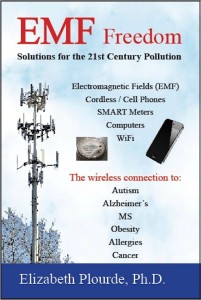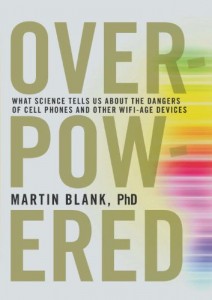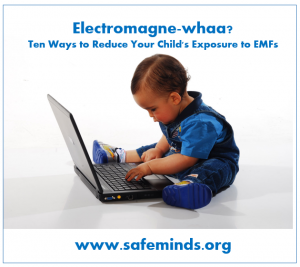New Study Says EMFs On Par With DDT Or Lead For Children: 10 Ways To Limit Your Exposure
Image Shutterstock/Alexey Losevich
Editor’s Note: The International Agency for Research on Cancer (IRIC), part of the United Nations’ World Health Organization (WHO), classifies more than 250 agents, including chloroform, lead, gas and DDT as Class 2B Carcinogens, and now radiofrequency electromagnetic fields (RF/EMF). Sources of RF/EMF include radios, televisions, microwave ovens, cell phones, and Wi-Fi devices. Read more about the report published in the Journal of Microscopy and Ultrastructure entitled “Why children absorb more microwave radiation than adults: The consequences” in this Forbes article here. Thanks to SafeMinds for the 10 Ways To Limit Your EMF Exposure below!
I know. We’ve already got you smelling your kid’s shoes before you buy them, searching for a couch made without flame retardants, and fretting about themercury in your mouth, and now I’m adding another concern to your list: Your child’s exposure to electromagnetic fields (EMFs).
What are these things anyway?
And why should you be concerned about them?
An Electromagnetic field (EMF) is a field produced by any object that is electrically charged.
Electromagnetic fields are present everywhere in our environment. EMF technology is a remarkable breakthrough of great business and social importance. Our society no longer functions without it. Many of our jobs rely on EMF technology. We also stay in touch with the people we love through cell phones, we watch over our babies through wireless baby monitors, and we heat up our dinners in the microwave.
Because EMFs are invisible areas of energy, many of us are not aware of the extent to which they exist. If we could see them, we’d be able to see EMFs stream in through our windows, ceilings, and walls. Some of this radiation can penetrate a few inches into our body; some of it passes right through our skin, muscle, and bone.
We know, as the World Health Organization points out, the earth has its own magnetic field—used by birds and fish for navigation—and there are other instances of naturally occurring EMFs, when electricity builds up during a thunderstorm, for example.
But in recent decades, with the increasing popularity of cell phones and personal computers, we’re living in a soup of manmade EMFs.

Why should we care?
The neurons in the human brain are continuously converting chemical signals to electrical signals and back again. That’s how our brain cells communicate.
It stands to reason that things that interfere with electrical signaling may have the potential to alter our brains.
“It makes biological sense that we should be concerned about this,” my friend and colleague Sallie Bernard explains. “Some people are reporting feel healthier and less dyregulated after reducing their exposures to EMFs.”
Some studies have shown a possible link between electromagnetic field strength and an increased risk for childhood leukemia.
And we now know it is not necessary for the strength of an EMF to be high for a biological happening to occur – there is considerable evidence that even extremely weak signals can have physiological consequences.
Research from Sweden released October 2014 found teenagers who began using cell phones before age 20 had 5 times more brain cancer by the time they reached their late 20’s.
Finally, it’s children with developing organs who are most sensitive to possible effects of exposure to electromagnetic fields.
Are Electromagnetic Fields Implicated in Autism?
A recent peer-reviewed scientific series by Cindy Sage, who works for Sage Associates, an EMF Consulting Firm, and Dr. Martha Herbert, Ph.D., M.D., a pediatric neurologist and brain development researcher at Harvard University, looked at the existing science in order to evaluate potentials for a cause-and-effect relationship between electromagnetic fields and radio frequency radiation (RFR) and autism symptoms.

These researchers found that behaviors in autism spectrum disorders may emerge from alterations of normal brain function, and that EMF/RFR have the potential to contribute to these alterations by creating an inability to achieve a normal balance in brain activity or to properly send and receive the electrical signals associated with normal brain function.
The main issues commonly related to EMF/RFR and autism spectrum conditions included impaired sensory processing associated with hearing and vision, seizures, and an almost universal presence of sleep disruption.
Further, the research team discovered that EMF/RFR exposure could lead to biological system overload and failure.
In other words, continuous exposure to electromagnetic fields might either overwhelm or eventually lead to an inability to tolerate the levels normally found, resulting in increasing risk, and worsening biological problems and symptoms.
Peter Sullivan, a father of two boys with autism who left Silicon Valley to start Clear Light Ventures, a public education organization to improve the quality of life for children with autism, explains that exposure to EMFs is another form of pollution. It isn’t natural, our bodies are not normally subjected to it in the amounts we are getting now, and it is causing negative health outcomes in people who are sensitive or overexposed.
Sage and Herbert believe that reducing exposure to EMF/RFRs might help remove barriers to proper function and healing in people with autism spectrum disorders.
According to the Occupational Safety and Health Administration, “Research continues on the possible biological effects of exposure…”
So … while we wait on that research to continue, we can take simple steps to limit our exposure to EMFs.
Here’s my best advice, compiled with the help of my colleagues Sallie Bernard and Eric Uram.
10 Ways to Keep a Safe Distance and Reduce Your Exposure to EMFs:
- Get those laptops OFF your lap: Laptop computers are a high energy source of both electric and magnetic fields, so avoid putting a laptop directly on your lap. Shield yourself with thermal and electric shields to reduce exposures.
- Unplug electrical devices before bed: Keep electrical devices out of bedrooms or unplug them at night (just turning off the on switch still allows electricity to enter the device) – alarm clocks, lamps, computers, phones. Buy battery-operated clocks or mechanical devices instead of electrical ones. Remember wind-up alarm clocks?
- Unplug and run off the battery: Some computer charging devices are ungrounded, you can reduce your exposures by 100 times or more using a laptop when it’s unplugged and running on battery rather than when it’s plugged into an outlet and charging (same goes for tablets, readers and even cell phones). Pregnant women should take special care when using these technologies while they’re plugged in.
- Cable it: Using cabling to connect to the internet rather than WiFi. Desktops, laptops, printers and even tablet computers can all be connected via cables to minimize EMF signals (here’s a video showing how to connect to an iPad.)
- Opt out of Smart Meters: “Smart Meters” send local signals on utility use – electricity, natural gas, water and sewerage – and are a dangerous source of EMFs. Property owners can opt-out of the service in many communities.
- Choose wiring over WiFi: During construction or remodeling, be sure to build in hardwired options behind walls for all electrical systems including security, lighting, entertainment and HVAC controls so communication is done through wires and not WiFi. If you do use WiFi, don’t have a major WiFi router that beams to your whole house. Instead, get a low-energy router with repeater sites that help get the signal everywhere but reduces the intensity of the signal in any given place and can be adjusted to send pulse signals less frequently.
- Shield electrical wires: Metal shielding or metal conduit like twisted Romex, BX, or armored cable helps prevents emission of dirty electricity.
- Charge your phone or tablet in another room: Don’t keep your cellphone in your bedroom. Charge it, and other electrical devices away from sleeping areas.
- Get corded: Those old-fashioned corded phones that we all grew up with? These days folks are making pocket books that look like them, and piggybanks. Use corded phone systems wherever possible rather than cell phones or cordless phones. Forward your cellphone to your corded phone when at home or in the office.
- Headsets help: Use low-emission corded headsets connected to your cellphone or cordless handset instead of holding a wireless phone to your head.
This blog is adapted from an article I wrote with Sallie Bernard and Eric Uram for this month’s Autism File. For more details about this reducing EMF exposure, read the full article here.



